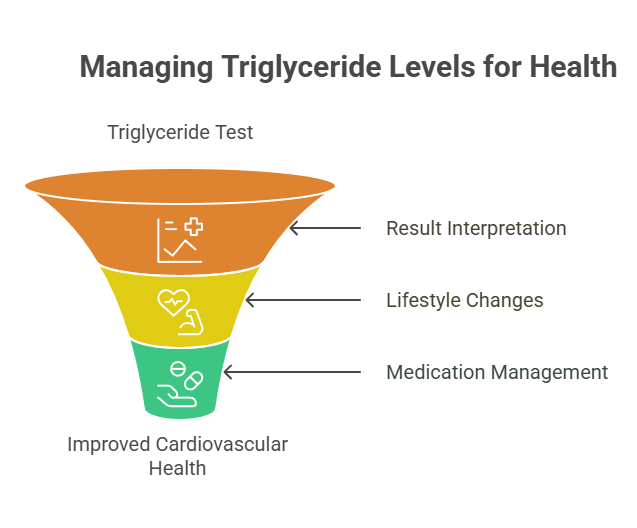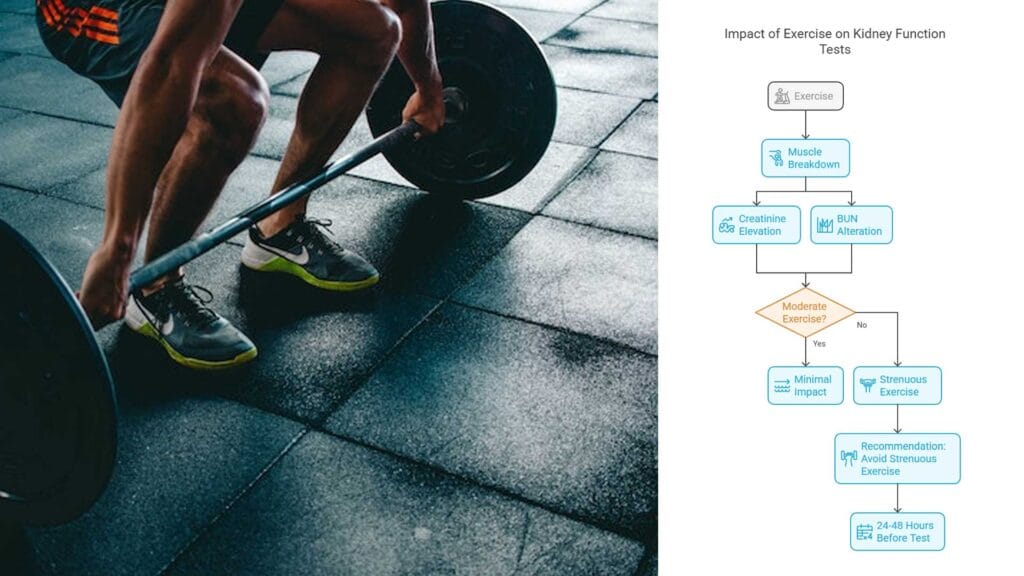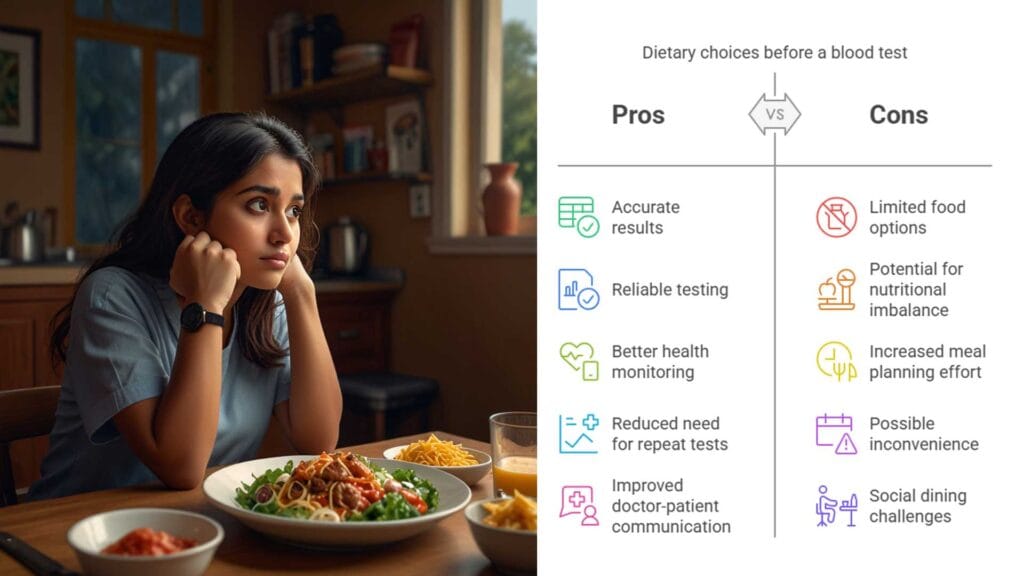
What is Triglycerides Test
A triglycerides test is leveraged to determine the triglycerides levels in your blood. Triglycerides are essentially the stored fat substance in your body, which you tend to accumulate through extra calories intake. These lipid substances are used by your body as an inherent source of energy. However, when your serum triglycerides blood test results exhibit beyond normal levels, you might be at a higher risk of developing cardiovascular diseases, such as heart attacks, strokes. In certain instances, abnormally high levels of s triglycerides have been linked to acute pancreatitis in children and adults.
About Triglycerides Blood Test
Learn everything about triglyceride level test before you book lab test online. Understand the why, how, and what of this test.
Why Do I Need Triglycerides Level Test?
Your healthcare provider will ask you to undergo a TGL test as a part of routine check-up. You will be asked to get tested for high serum triglycerides
- To gauge your potential risk of developing cardiovascular and peripheral arterial diseases.
- To understand how your treatment is proceeding against high triglycerides/cholesterol levels.
- If you have a past or family history of early-age heart diseases.
- If you have sedentary lifestyle habits, such as excessive smoking, alcohol consumption, excessive eating, and lack of adequate physical exercise.
- If you have lifestyle disorders, such as obesity, hypertension, etc.
Males aged above 45 years and females aged above 50 years are usually recommended to check their serum triglycerides levels periodically to minimise the risk of cardiovascular concerns.
How To Prepare For Triglycerides Blood Test?
To prepare for Triglycerides level check-up, follow these steps: Consult your healthcare provider, inform them about medications, avoid intense exercise, follow fasting instructions if given, and provide accurate medical history.
What Happens During Triglycerides Testing?
TGL Blood Testing only takes a few minutes.
- As per the scheduled time of the blood test, a lab technician who usually takes blood samples will arrive.
- A thin needle will be used to draw blood from your arm’s vein.
- The needle might cause a mild pinch and some discomfort.
- The lab technician then fills a collection tube with blood and then removes the needle from the skin.
- They place a small bandage on the arm.
Finding Triglycerides Blood Test
Should you book blood test online to check your Triglycerides levels or go to the nearest clinic and get it done by a medical professional? Let’s Find Out.
Can I Take Triglycerides Test At Home?
Yes, the Triglycerides blood testing can be taken at home. You can even book TGL Blood Test online, eliminating the need for a doctor’s visit or a trip to a lab. It is always preferable to consult with a healthcare provider about any concerns regarding your test results.
How Much Does Triglycerides Test Cost?
Are you curious about the Triglycerides Test price? At HealthcareOnTime, we believe in providing cost-effective solutions to keep you informed about your lipid profile.
The Triglycerides Test price may vary depending on several factors, including your location, the healthcare provider, and your insurance coverage. However, we’re pleased to offer this essential test at an affordable rate of just INR 200! Our prices not only compete in the market but also maintain the highest quality standards.
In India, the cost of a Triglycerides Test typically starts from INR 300, but prices may vary based on the specific laboratory and city. Monitoring your lipid panel, including triglycerides, is crucial, especially if you have concerns related to heart health or metabolic disorders.
But here’s the exciting part – HealthcareOnTime is committed to making healthcare accessible to all. We provide valuable services, including affordable Triglycerides testing, in over 4500+ pincodes nationwide.
Test Result Interpretation
You received your TGL Test results but still need help determining if they fall under the normal range. Read this section to understand whether your results are within the Triglycerides normal range or not.
What Does Triglycerides Test Results Mean?
Normal triglycerides levels are essential for your body to access sustained energy round the clock. However, higher than normal levels of triglycerides may indicate that you are at a higher risk of developing cardiovascular health ailments, more so if you have a past or family history. Normal or less than normal levels of serum triglycerides usually indicate that you are leading a healthy lifestyle and your chances of developing a heart disease or stroke is considerably minimal.
What Is Triglycerides Test Normal Range?
150 mg/dL is deemed as the normal range for triglycerides while anything between 150 to 199 mg/dL is considered borderline.
| Triglyceride Level | Remarks |
| Less than 150 mg/dL | Normal |
| 150 to 199 mg/dL | Borderline |
| 200 to 499 mg/dL | High |
| 500 mg/dL and more | Very high |
[Source]
What Medical Conditions Can Cause High Triglycerides Levels?
Elevated triglycerides levels can be caused by medical conditions, such as
- Unmanaged Diabetes – Insulin resistance is a common symptom of unmanaged diabete, Poorly controlled diabetes, both type 1 diabetes and type 2 diabetes, often leads to insulin resistance. In such scenarios, the carbohydrate and glucose levels tend to be high, which is also associated with high triglycerides levels.
- Liver Diseases – The Liver is also responsible for the production of triglycerides. In case of liver diseases, this function is compromised, which leads to high triglycerides levels.
- Kidney Diseases – kidney diseases can contribute to high triglyceride levels. The kidneys are responsible for filtering waste products from the blood, and any dysfunction or damage to the kidneys may have an impact on lipid metabolism, including triglycerides.
- InflammatoryDiseases – Chronic inflammation in conditions like Rheumatoid Arthritis can disrupt lipid metabolism, raising triglyceride levels.
- Thyroid Diseases – Thyroid diseases can affect triglyceride levels. Hypothyroidism (underactive thyroid) can lead to high triglycerides, while Hyperthyroidism (overactive thyroid) can result in lower triglycerides. The thyroid hormones influence lipid metabolism, impacting the breakdown and clearance of triglycerides from the blood.
What Medical Conditions Can Cause Low Triglycerides Levels?
Well-managed serum triglyceride levels are much desired but quite difficult to attain. There is insufficient research and studies that cite certain medical conditions to be the cause of low s triglycerides levels.
You can achieve normal triglyceride levels by addressing its most potential risk factors, such as menopause, HIV and Pregnancy. Opting for healthier lifestyle choices, such as maintaining optimal body weight, limiting alcohol consumption, avoiding diets rich in high sugar, salt and fat content and indulging in consistent physical activities can help you achieve normal triglycerides levels.
Why Choose HealthcareOnTime?
Convenience at Your Doorstep
Ever wished for healthcare that comes to you? HealthcareOnTime makes it a reality with doorstep lab testing, cutting out clinic hassles. No more queues or travel stress. Experience at-home sample collection, prioritizing health without time constraints. —your path to health, now just a doorstep away!
Affordable Testing with Thyrocare Partnership
Experience cost-effective lab testing at-home with HealthcareOnTime’s exclusive partnership with Thyrocare. Benefit from competitive prices while ensuring precise results. Our collaboration with Thyrocare Technologies Limited guarantees affordability without compromising on the accuracy and reliability of your lab test.
Comprehensive Health Screening
At HealthcareOnTime, we’ve got your back with our comprehensive health checkup packages! Take charge of your well-being by booking online. These packages empower you to stay ahead, catching potential issues early for timely management. It’s like having a health ally, and making informed decisions for a healthier, happier life.
Disclaimer: Although we have endeavoured to provide accurate information on this page, we strongly recommend that you seek advice from your doctor before relying on any of the test ranges or lab-test recommendations mentioned herein.
More Related Tests
Why To Book with HealthCareOnTime

17 Crores+ Samples Processed

World Class Technology Labs

25+ Years of Trust & Experience

Free Home Collection
FAQs Around Triglycerides Test (TGL)
Can high triglycerides be cured?
Triglycerides cannot be cured, but they can be managed effectively. Triglyceride levels are influenced by genetics, diet, lifestyle, and underlying health conditions. By making lifestyle changes such as adopting a healthy diet, exercising regularly, maintaining a healthy weight, limiting alcohol consumption, and quitting smoking, individuals can effectively manage their triglyceride levels. Medications may also be prescribed by healthcare professionals to further control triglycerides.
What foods cause high triglycerides?
Foods high in saturated fats, trans fats, and added sugars can contribute to elevated triglyceride levels. These include fatty meats, full-fat dairy products, fried foods, processed snacks, sugary beverages, and desserts. Consuming these foods in excess can lead to increased triglyceride production in the liver. It is crucial to limit the intake of these foods and focus on a balanced diet rich in fruits, vegetables, whole grains, lean proteins, and healthy fats like those found in nuts, seeds, and fish.
Does walking reduce triglycerides?
Yes, walking and regular exercise can help reduce triglyceride levels. Physical activity increases the body’s energy expenditure, which promotes the breakdown of triglycerides stored in fat cells. Regular exercise also improves insulin sensitivity, which can help regulate triglyceride production. Walking for at least 30 minutes a day, five days a week, can have a positive impact on triglyceride levels. However, it’s important to combine exercise with a healthy diet and consult a healthcare professional for personalized advice on managing triglycerides.












